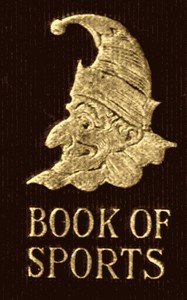Mr. Punch's Cockney Humour by J. A. Hammerton (the best books to read .TXT) 📖

- Author: J. A. Hammerton
Book online «Mr. Punch's Cockney Humour by J. A. Hammerton (the best books to read .TXT) 📖». Author J. A. Hammerton
'Olloway.
Seven Scissors Road.
Crouch Hend.
'Ighgate and'Ampstead.
Heast Hend.
Finchley and 'Endon.
Mill 'Ill.
Hedgware.
There's a lot for you! And t'other line goes to 'Arford, 'Atfield, and Saint All-buns. Saint All Buns would be a good feast, eh, sir?
Yours,
Enery.
Hivy 'Ouse, 'Oxton.
[Pg 45]

First Combatant. "—! —! —! —! &c."
Bystander. "Why don't yer answer 'im back?"
Second Combatant. "'Ow can I? 'E's used all the best words!"
[Pg 46]
A COCKNEY RHAPSODY[A critic in the Daily News accuses artists generally of ignorance in their treatment of rural subjects, and declares that nearly every picture of work in the hay or harvest field is incorrect.]
Come revel with me in the country's delights,
Its rapturous pleasures, its marvellous sights;
No landscape of common or garden I praise,
But Nature's strange charms that the painter pourtrays.
No summer begins there, and spring never ends,
It mingles with autumn, with winter it blends;
Its primroses bloom when the barley is ripe,
Amid its red apples the nightingales pipe.
There often the shadow falls southward at noon,
And sunrise is hailed by the pale crescent moon,
The sun sets at will in the east or the west,
In the grove where the cuckoo is building her nest.
There the milkmaid sits down to the left of the cow,
In harvest they sow, and in haytime they plough;
While mowers, in attitudes gladsome and blythe,
Impossible antics perform with the scythe.
There huntsmen in June after foxes may roam,
And horses unbridled go champing with foam;
From torrents by winter fierce swollen and high,
The proud salmon leaps in pursuit of the fly.
Ah Nature! it's little—I own for my part—
I know of your face save as mirrored in art;
Yet, vainly shall critics begrudge me that charm,
For a fellow can paint without learning to farm.
[Pg 47]
 Bethnal Green.
Bethnal Green.
East-Ender. "'Ary Scheffer!' Hignorant fellers, these foreigners Bill! Spells 'Enery without the haitch!"
[Pg 48]
Overheard at a Meeting of the Up-in-a-Balloon Society.'Arry. Wot's the difference between Nelson and that cove in the chair?
Charlie. Give it up, mate.
'Arry. Wy, Nelson was a nautical 'ero, and this chap's a 'ero nautical, to be sure.
'Arry 'ad—for Once. Scene—Exterior of St. James's Hall on a Schumann and Joachim Night.'Arry (meeting High-Art Musical Friend, who has come out during an interval, after assisting at Madame Schumann's magnificent reception). 'Ullo! What's up? What are they at now?
High-Art Friend (consulting programme). Let me see. They've done "Op. 13." Ah, yes! They've just got to "Op. 44."
'Arry (astounded). 'Op forty-four! St. James's 'All got a dancin' licence! Hooray! I'm all there! I'll go in for 'Op forty-five. What is it, a waltz or a polka?
[Rushes to the pay-place.]
[Pg 49]
 "Rude am I in My Speech" (Othello)
The Language of Flower Girls
"Rude am I in My Speech" (Othello)
The Language of Flower Girls
[Pg 50]
THE COMPLAINT OF THE COCKNEY CLERK"I know of no cure but for the Englishman (1) to do his best to compete in the particulars where the German now excels; (2) to try to show that, taken all round, he is worth more than the German."—Mr. Gladstone on English Clerks and German Competition.
All very fine, O orator illustrious!
But I as soon would be a mole or merman,
As a short-grubbing, horribly industrious,
Linguistic German.
A clerk's a clerk, that is a cove who scribbles
All day, and then goes in for cue, and "jigger,"
And not a mere machine who feeds by nibbles,
Slaves like a nigger.
Learn languages? And for two quid a week?
Cut barmaids, billiards, bitter beer and betting?
Yah! that may suit a sausage, or a sneak!
Whistles need wetting.
That is if they are genuine English whistles,
And not dry, hoarse, yah-yah Teutonic throttles.
I'm not a donkey who can thrive on thistles.
No, that's "no bottles."
I've learned my native tongue,—and that's a teaser—
I've also learned a lot of slang and patter;
But German, French, Italian, Portuguese, sir,
For "screw" no fatter?[Pg 52]
Not me, my old exuberant wood-chopper!
Level me to the straw-haired Carls and Hermanns?
No; there's another trick would do me proper,—
Kick out the Germans!
Old Bismarck's "blood and iron's" a receipt meant
For sour-krautt gobblers, sandy and sardonic!
But for us Britons that Teutonic treatment
Is much too tonic.
The cheek of 'em just puts me in a rage,
Send 'em back home, ah! even pay their passage
Or soon, by Jove, we'll have to call our age,
The German "sauce"-age!
[Pg 51]
 An Informal Introduction.
An Informal Introduction.
'Arry (shouting across the street to his "Pal"). "Hi! Bill! This is 'er!"
"ON A CLIFF BY THE SEA" (Whit Monday)A verse for "'Arry"? Well, I'm shot!
(Excuse my language plain and terse)
For such a nuisance I have not
A verse.
His praise don't ask me to rehearse,
But, if you like—I'll tell you what—
The rôle of Baalam I'll reverse.
Only, like Balak, from this spot
Desire me 'Arry's tribe to curse,
To grant that prayer you'll find me not
Averse!
[Pg 53]

'Arriet. "Wot toime his the next troine fer 'Ammersmith?"
Clerk. "Due now."
'Arriet. "'Course Oi dawn't now, stoopid, or I wouldn't be harskin' yer!"
[Pg 54]
'ARRY IN ROME AND LONDONA kind correspondent calls Mr. Punch's attention to the fact that 'Arry the ubiquitous crops up even in the classics as Arrius, in fact, in Carmen lxxxiv. of Catullus. How proud 'Arry will be to hear of his classical prototype! Our correspondent "dropping into verse," exclaims:—
Yes! Your Cockney is eternal;
Arrius speaks in 'Arry still;
Vaunts 'is "hincome" by paternal
"Hartful" tricks hup 'Olborn 'Ill.
How well he is justified may be seen by a glance at the text of Catullus:—
DE ARRIO."Chommoda" dicebat, si quando commoda vellet
Dicere, et "hindsidias" Arrius insidias:
Et tum mirifice sperabat se esse locutum.
Cum, quantum poterat, dixerat "hinsidias."
Credo, sic mater, sic Liber avunculus ejus.
Sic maternus avus dixerit, atque avia.
Catullus, Carmen lxxxiv.
Which—for the benefit of 'Arry himself, who is not perhaps familiar with the "Lingo Romano"—though he may know something of a "Romano" dear to certain young sportsmen, though not[Pg 56] dearer to them than other caterers—may thus be very freely adapted:—
'Arry to Hoxford gives the aspirate still
He cruelly denies to 'Igate 'Ill;
Yet deems in diction he can ape the "swell,"
And "git the 'ang of it" exceeding well.
Doubtless his sire, the 'atter, and his mother,
The hupper 'ousemaid, so addressed each other;
For spite of all that wrangling Board Schools teach,
There seems heredity in Cockney speech.
Commercial Intelligence.According to a trade circular issued by a Cockney company, Florence and Lucca, whence the finer description of oils have been heretofore imported, are threatened with a vigorous competition by the Iles of Greece.
The Richest Dish in the World.—The "weal" of fortune.
'Arry's Motto.—"Youth on the prowl and pleasure at the 'elm."
[Pg 55]

Lady. "Half-a-crown, indeed! Your fare is eighteen-pence. I looked it up in Bradshaw."
Cabman. "Well, to be sure! Wot a good wife you would 'ave made for a pore man!"
[Pg 57]
 Back to the Land.
Back to the Land.
Farmer's Wife (who has told the new lad from London to collect eggs). "Well, Jack, have you got many?"
Jack (who has raided a sitting hen). "Rauther! One old 'en she's bin and layed thirteen, and I don't think she's finished yet!"
[Pg 58]
LINES BY A COCKNEYAddressed to A Young Lady, but dropped by some mistake into Mr. Punch's letter-box.
Sweet hangel, whom I met last heve
Hat Mrs. Harthur's 'op,
I 'ope that you will give me leave
A question now to pop.
I mind me 'ow when in the 'all
Your carriage was hannounced,
You hasked me to hadjust your shawl,
Hon which with 'aste I pounced.
Then heager to your Ma you ran,
She anxious to be gone,
I 'eard 'er call you Mary-Hann,
Or helse 'twas Mari-hon.
Now, Mary-Hann's a name I 'ate
Has much as Betsy-Jane,
I could not bear to link my fate
With such a 'orrid name;
But Mari-hon I like as well
As hany name I know;
Then, hangel, I emplore thee tell,
Dost spell it with a Ho?
[Pg 59]
 POLITICS AND GALLANTRY
POLITICS AND GALLANTRY
First 'Arry. "Hay, wot's this 'ere Rosebery a torkin' abaat? Bless'd if he ain't a goin' to do awy with the Lords!"
Second 'Arry (more of a Don Juan than a Politician). "Do awy with the 'ole bloomin' lot o' Lords, if he likes, as long as he don't do away with the lidies!"
[Pg 60]
 "AND SHE OUGHT TO KNOW!"
"AND SHE OUGHT TO KNOW!"
"That's supposed to be a portograph of Lady Solsbury. But, bless yer, it ain't like her a bit in private!"
[Pg 61]
 'ARRY'S AUNT UPON THE CLIFF
'ARRY'S AUNT UPON THE CLIFF
A study in perspective done by 'Arry with a 'and camera.
[Pg 62]
ECHO'S ANSWERSTo a Cockney Inquirer who consults her concerning the inevitable Annual "Outing" and its probable issues.
Inquirer. What subject sets me worrying and doubting?
Echo. "Outing."
Inquirer. My wife suggests for family health's improving?—
Echo. Roving.
Inquirer. What's the first requisite for taking pleasure?
Echo. Leisure.
Inquirer. The second (for a slave to matrimony)?
Echo. Money.
Inquirer. You say that woman of all founts of mischief—
Echo. Is chief.
Inquirer. What is this close agreement of my women?
Echo. Omen.
Inquirer. I fear for me they'll prove a deal too clever?
[Pg 64]
Echo. Ever.
Inquirer. What is the manner of my buxom Mary?
Echo. Airy.
Inquirer. And what's her goal in every hint and notion?
Echo. Ocean.
Inquirer. How recommends she Ramsgate, shrimpy, sandy?
Echo. 'Andy.
Inquirer. Whereas I hold it at this season torrid?—
Echo. 'Orrid!
Inquirer. And hint, with a faint view to scare or stop her?—
Echo. 'Opper!
Inquirer. (Meaning the Pulex). Answers she politely?
Echo. Lightly.
Inquirer. How then am I inclined to view the mater?
Echo. 'ate her.
Inquirer. What feel I when she hints at sea-side clothing?
[Pg 66]
Echo. Loathing.
Inquirer. Mention of what makes all my family scoffers?
Echo. Coffers.
Inquirer. Then if I storm, what word breaks sequent stillness?
Echo. Illness!
Inquirer. What feels a man when women 'gin to blubber?
Echo. Lubber.
Inquirer. What is the show of patience that may follow?
Echo. Hollow!
Inquirer. What would the sex when it assumes that virtue?
Echo. Hurt you.
Inquirer. What's the result of halting and misgiving?
Echo. Giving.
Inquirer. What is man's share anent this yearly yearning?
Echo. Earning.
Inquirer. What's the chief issue of this seaward flowing?
[Pg 68]
Echo. Owing.
Inquirer. How long before I'm free of tradesmen's pages?
Echo. Ages!
The Moors.Our Cockney correspondent says that the birds are very wild, and that the heath being extremely slippery, the attempt to run after them is apt to be attended with numerous falls, especially in patent-leather boots. He says the exercise is fatiguing in the extreme, and complains that there are no cabs to be had on the hills though there are plenty of flies.
Double Cockney Conundrum for the Derby Day."What eminent composer would in England have probably been 'in the ring'?"
"'Aydn."
"Why?"
"Because who ever 'eard of





Comments (0)